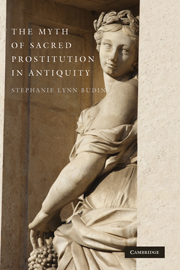Book contents
- Frontmatter
- Contents
- Acknowledgments
- Abbreviations
- THE MYTH OF SACRED PROSTITUTION IN ANTIQUITY
- 1 Introduction
- 2 The Ancient Near Eastern Data
- 3 The So-Called “Evidence”
- 4 Herodotos
- 5 In the Footsteps of Herodotos: Lucian and “Jeremiah”
- 6 Pindar Fragment 122
- 7 Strabo, Confused and Misunderstood
- 8 Klearkhos, Justinus, and Valerius Maximus
- 9 Archaeological “Evidence” from Italy
- 10 The Early Christian Rhetoric
- 11 Last Myths
- Bibliography
- Index
- Index Locorum
5 - In the Footsteps of Herodotos: Lucian and “Jeremiah”
Published online by Cambridge University Press: 18 August 2009
- Frontmatter
- Contents
- Acknowledgments
- Abbreviations
- THE MYTH OF SACRED PROSTITUTION IN ANTIQUITY
- 1 Introduction
- 2 The Ancient Near Eastern Data
- 3 The So-Called “Evidence”
- 4 Herodotos
- 5 In the Footsteps of Herodotos: Lucian and “Jeremiah”
- 6 Pindar Fragment 122
- 7 Strabo, Confused and Misunderstood
- 8 Klearkhos, Justinus, and Valerius Maximus
- 9 Archaeological “Evidence” from Italy
- 10 The Early Christian Rhetoric
- 11 Last Myths
- Bibliography
- Index
- Index Locorum
Summary
Herodotus, like all Greeks, wrote about “barbarians” with the intention of proving the superiority of Greeks, and allegations of cannibalism and sexual licentiousness abound. In his descriptions of barbarian sexual mores, he may also have been trying to show the horrible results that could follow if proper women were not kept as guarded and secluded as they were in Greece. All the later Roman and Christian allegations of sexual initiation ultimately derive from this one passage in Herodotus.
Such a testimonial, although perhaps just a bit overstated, is not uncommon among modern scholars who see in ancient references to sacred prostitution not historical accuracy but accusation. As one of the earliest authors to write clearly and directly (apparently) about the perceived ancient custom, Herodotos gets a lot of flak for supposedly denigrating his eastern neighbors, and even more so for getting the “sacred prostitution ball” rolling. It was Herodotos, many claim, who created the entire myth. Thus J. G. Westenholz notes that “Such allegations first appear in the work of Herodotus (Hist. 1.199) whose view of Mesopotamian culture was considerably biased and whose speculations have been elaborated by Strabo in his Geography (16.1.20), and by other classical authors.” Oden, in his analysis of the literary sources for sacred prostitution, concludes, “What appears to be a list of more than a dozen sources may in fact be a list of a couple of sources, perhaps even and ultimately a single source: Herodotus.
- Type
- Chapter
- Information
- The Myth of Sacred Prostitution in Antiquity , pp. 93 - 111Publisher: Cambridge University PressPrint publication year: 2008



